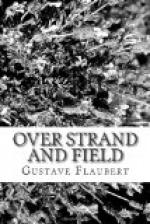After we had inspected the chapel carefully, we walked to the river, crossed it in a boat, and plunged into the country.
It is absolutely deserted and strangely empty. Trees, bushes, sea-rushes, tamarisks, and heather grow on the edge of the ditches. We came to broad stretches of land, but we did not see a soul anywhere. The sky was bleak and a fine rain moistened the atmosphere and spread a grey veil over the country. The paths we chose were hollow and shaded by clusters of foliage, the branches of which, uniting, drooped over our heads and almost prevented us from walking erect. The light that filtered through the dome of leaves was greenish, and as dim as on a winter evening. But farther away, it was brilliant, and played around the edges of the leaves and accentuated their delicate pinking. Later we reached the top of a barren slope, which was flat and smooth, and without a blade of grass to relieve the monotony of its colour. Sometimes, however, we came upon a long avenue of beech-trees with moss growing around the foot of their thick, shining trunks. There were wagon-tracks in these avenues, as if to indicate the presence of a neighbouring castle that we might see at any moment; but they ended abruptly in a stretch of flat land that continued between two valleys, through which it would spread its green maze furrowed by the capricious meanderings of hedges, spotted here and there by a grove, brightened by clumps of sea-rushes, or by some field bordering the meadows which rose slowly to meet the hills and lost themselves in the horizon. Above these hills, far away in the mist, stretched the blue surface of the ocean.
The birds are either absent or they do not sing; the leaves are thick, the grass deadens one’s footfalls, and the country gazes at you like some melancholy countenance. It looks as if it had been created expressly to harbour ruined lives and shattered hopes, and to foster their bitterness beneath its weeping sky, to the low rustling of the trees and the heather. On winter nights, when the fox creeps stealthily over the dry leaves, when the tiles fall from the pigeon-house and the reeds bend in the marshes, when the beech-trees stoop in the wind, and the wolf ambles over the moonlit snow, while one is alone by the dying embers listening to the wind howl in the empty hallways, how charming it must be to let one’s heart dwell on its most cherished despairs and long forgotten loves!
We spied a hovel with a Gothic portal; further on was an old wall with an ogive door; a leafless bush swayed there in the breeze. In the courtyard the ground is covered with heather, violets, and pebbles; you walk in, look around and go out again. This place is called “The temple of the false gods,” and used to be, it is thought, a commandery of Templars.
Our guide started again and we followed him. Presently a steeple rose among the trees; we crossed a stubble-field, climbed to the top of a ditch and caught a glimpse of a few of dwellings: the village of Pomelin. A rough road constitutes the main street and the village consists of several houses separated by yards. What tranquillity! or rather what forlornness! The thresholds are deserted; the yards are empty.




